issue contents
December 2013 issue
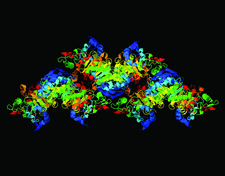
Cover illustration: Structure of the uracil complex of Vaccinia virus uracil DNA glycosylase (Schormann et al., p. 1328).
editorial
Free 

The Editors of Acta F look forward to 2014.
structural communications
The X-ray structure of the light, oxygen or voltage domain 2 of phototropin 1 from A. thaliana (AtLOV2) in its dark-adapted state has been determined. The N-terminal flanking A′α helix of AtLOV2 plays a role in its dimerization.
PDB reference: phototropin 1 LOV2 domain, 4hhd
The structure of the secretion domain of HxuA from H. influenzae has been determined to 1.5 Å resolution.
PDB reference: secretion domain of HxuA, 4i84
Open  access
access
 access
accessThe crystal structure of the uracil complex of Vaccinia virus uracil DNA glycosylase (D4) has been determined at 2.03 Å resolution.
PDB reference: uracil DNA glycosylase, complex with uracil, 4lzb
The 1.82 Å resolution X-ray structure of a thermally tolerant glycoside hydrolase family 74 enzyme from A. cellulolyticus is reported.
PDB reference: family 74 glycoside hydrolase, 4lgn
Open  access
access
 access
accessTwo structures of human Siah1 at 1.95 and 1.58 Å resolution provide more complete models for this protein and identify conformational variability in the subdomain organization.
The glycine-rich loop of MK2 (MAPKAP-K2) bound to the non-selective inhibitor TEI-L03090 adopts the β-form, which is commonly found in other kinase complexes; however, it differs from the α-form which is adopted when MK2 is bound to the MK2-selective inhibitor TEI-I01800. These results show how conformational change of MK2 influences its selectivity.
PDB reference: MK2–TEI-L03090 complex, 3wi6
crystallization communications
Structural insights into the type-VIII protein secretion system are described.
MbtN (Rv1346) from M. tuberculosis was cloned, overexpressed, purified and crystallized. The crystals diffracted to 2.3 Å resolution.
Human peptidylarginine deiminase type I was crystallized using polyethylene glycol as a precipitant. The crystals belonged to space group P61, with unit-cell parameters a = b = 90.3, c = 372.3 Å, and contained two molecules in the asymmetric unit.
A selenomethionine-labelled active-site mutant of `loopless' family GH19 chitinase from B. coronatum has been co-crystallized with chitotetraose. X-ray diffraction data were collected to 1.58 Å resolution using a synchrotron-radiation source.
The trimeric L-shaped fibre protein from bacteriophage T5 has been analysed by electron microscopy and a C-terminal domain has been crystallized. Diffraction data have been obtained for two native crystal forms and one selenomethionine derivative.
Two-dimensional crystallization conditions for intact bovine F-ATP synthase have been established.
The chimeric protein LKB1–14-3-3ζ was purified and crystallized. The X-ray diffraction were collected to a resolution of 2.9–Å.
A C-terminal domain of the fibre protein from snake adenovirus 1, an atadenovirus, has been crystallized. Diffraction data have been obtained to high resolution for several native crystal forms and a selenomethionine derivative.
Recombinant SAG19 from E. tenella has been overexpressed, purified and crystallized in a form suitable for X-ray analysis.
This study reports the crystallization of a new nucleotide state of the ATPase domain of a bacterial transcription activator NtrC1 from the hyperthermophilic bacterium Aquifex aeolicus. Wild-type NtrC1 ATPase domain was crystallized in the presence of the ATP analog ADP–BeFx–Mg and the crystals diffracted anisotropically to at best 3.2, 5.2 and 3.2 Å resolution in the a*, b* and c* directions, respectively.
Donor-strand complemented AggA subunit of aggregative adherence fimbriae type I from Shiga toxin-producing E. coli O104:H4 was crystallized. Diffraction data were collected to 1.55 Å resolution. Initial phases were derived from a sulfur single anomalous diffraction experiment.
The N-terminal cysteine, histidine-dependent amidohydrolase (peptidase) domain of the S. aureus bacteriophage K endolysin LysK has been crystallized. Native and derivative data to a resolution of 1.7–1.8 Å have been obtained, which allowed structure solution.
The class B carbapenemase IMP-18 from P. aeruginosa was overexpressed in E. coli, purified and crystallized. The crystals belonged to space group P41212 and diffracted to 2 Å resolution.
The crystallization and preliminary X-ray diffraction analysis of BRCA1 BRCT with ABRAXAS phosphopeptide are reported. Binding affinity using ITC has been compared.
A comparative study of vapor diffusion versus liquid–liquid diffusion methods used for the crystallization of EndoS is reported. X-ray diffraction data to 2.6 and 1.9 Å resolution were collected for wild-type endoglycosidase and glycosynthase constructs of EndoS, respectively.
Open  access
access
 access
accessA crystal of Tm-1, which is an inhibitor protein of Tomato mosaic virus RNA replication, was obtained using the hanging-drop vapour-diffusion method at 293 K and diffracted X-rays to 2.7 Å resolution. It belonged to space group P1, with unit-cell parameters a = 77.97, b = 105.28, c = 110.62 Å, α = 94.6, β = 109.3, γ = 108.0°.
The (R)-selective amine transaminase from A. fumigatus was purified and crystallized. Diffraction data to 1.84 Å resolution for S-SAD phasing as well as high-resolution data to 1.27 Å were collected from a single crystal belonging to space group C2221.
The expression, purification, crystallization and preliminary X-ray diffraction analysis of the N-terminal receiver domain of LytR, LytRN, from S. aureus is reported.
Argininosuccinate lyase from M. tuberculosis has been cloned, purified and crystallized, and preliminary X-ray studies on the crystals have been carried out.
The recombinant aspartate transcarbamoylase domain of human CAD was expressed in E. coli, purified and crystallized in the presence and absence of the inhibitor PALA. X-ray diffraction data sets were collected for both crystal forms at 2.1 Å resolution.
To determine the molecular basis underlying the ligand specificity of the ligand-binding regions of Pseudomonas chemotactic transducer A and B, complexes with amino acids have been purified and crystals have been produced.
The Escherichia coli cyclic AMP receptor protein (CRP) is a prokaryotic global transcription activator protein that controls the expression of many different genes. cAMP-free D53H CRP crystals were obtained and diffracted at a resolution of 2.9 Å. Based on the systematic absences of the crystals, the likely space group is P212121 with the unit-cell parameters a = 76.66, b = 152.14, and c = 176.11 Å. The asymmetric unit was confirmed to contain four protein dimers with a Matthews coefficient of 2.71 Å3 Da−1 and a solvent content of 54.68%.
The glycoside hydrolase family 30 module from the cellulosomal C. thermocellum XynGH30 was purified and crystallized and data were collected to 1.4 Å resolution.


 journal menu
journal menu









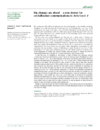



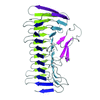
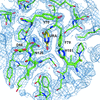


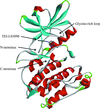






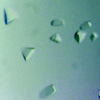








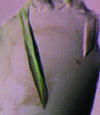


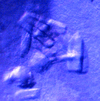




![[publBio]](/logos/publbio.gif)





